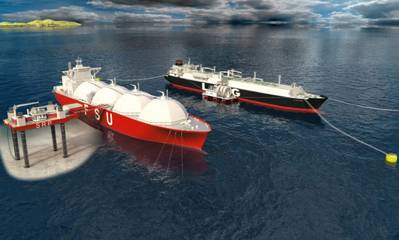Model Testing Complete for Delta Offshore Energy's 3.2GW LNG-to-Power Project
Delta Offshore Energy (DOE), a company working to develop the 3200 MW Bac Lieu LNG-to-Power Project in Vietnam, has said that model testing of the LNG receiving terminal technology has been successfully completed.
As previously reported DOE Delta Offshore Energy (DOE) in September 2020 signed a technology license agreement with Stena Power & LNG Solutions, under which Stena agreed to grant DOE a license to use its Jetty-Less LNG receiving and regas technology for the offshore LNG to power project located in the Bac Lieu Province in Southern Vietnam.
DOE plans to deploy Stena’s floating Jetty-Less Autonomous Transfer System (ATS) and Self-installing Regas Platform (SRP) solutions to provide energy to the 3200MW power plant in the Mekong Delta.
A few days ago, DOE said that scale model testing of the Jettyless Floating Terminal (JFT), the Self-installing Regas Platform (SRP), the Floating Storage Unit (FSU), and an LNG Carrier for the Project had been completed at the Maritime Research Institute Netherlands (MARIN) to verify and calibrate Stena’s computer simulations and research, ahead of construction and deployment of the assets to waters off Bac Lieu Province in Vietnam.
Large-scale models (up to 10m in length) were created on a scale of 1:30 to obtain test results with the highest possible accuracy, DOE said.
A number of various tests were performed by engineers from both Stena and MARIN to simulate critical wave, wind, and current conditions specific to local conditions in Vietnam, including 100-year cyclonic and monsoon events, DOE added.
"The oil and gas industry, particularly offshore, developed and evolved through innovation and change. This new configuration for LNG regasification and storage builds on the FSRU technology, which in 2007 everyone thought was crazy. Today we have a more modular system that can easily be scaled up without having to go to drydock or shipyards. If you are not innovating in this industry, you are falling behind,” said Bobby Quintos, Co-Founder and Managing Director of Delta Offshore Energy.
Bureau Veritas (BV) has recently also issued an Approval In Principle (AIP) for the complete LNG receiving facilities engineered by Stena for DOE’s project. A similar AIP has been issued by DNV for the Jettyless Floating Terminal.
“We are delighted to have successfully verified the performance of our JFT, SRP, and FSU through an extensive model test program with the support of the highly reputable and experienced engineers at MARIN. The model testing was carried out over 6 weeks to assist us to finalise the design, better understand performance limits in a variety of localized wave conditions, and ultimately ensure safe and effective operations. This is another important step forward in the hugely exciting Bac Lieu LNG-to-Power Project for our innovative client Delta Offshore Energy,” said Göran Hermansson, Chairman, Stena Power & LNG Solutions.
“We are ecstatic to bring the latest generation technology to Vietnam’s first floating LNG terminal as committed to the Government since we first introduced the project. Innovation in technology, along with policy and finance are key pillars to our success. Our Project provides Vietnam competitive access to global LNG sources, which brings about affordable, reliable, and clean power and gas to support the economy in its industry 4.0 ambitions,” Ian Nguyen, Co-Founder and Managing Director of Delta Offshore Energy added.
Related:













